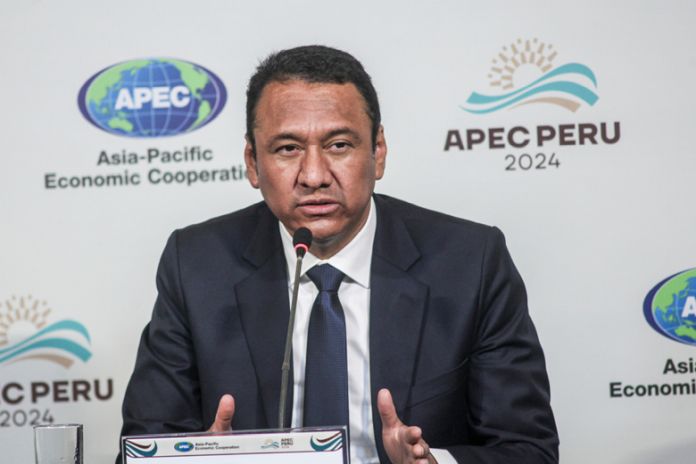- Food security is not just a matter of quantity but also of quality.”
By Angel Manero Campos
We have hard work to do in order to address the pressing challenges of food security in our region to transform our agri-food systems into a resilient, productive and inclusive one. This takes into account the context-specific for each of our economies as well as the social, economic and environmental context we are experiencing at a global level.
It is necessary to recall the importance of collaborative efforts and shared responsibility in ensuring food security for our people. The Asia-Pacific region, with its diverse landscapes and rich agricultural heritage, has a unique opportunity to lead the way in fostering sustainable agricultural practices and ensuring that every individual has access to nutritious and sufficient food.
Certainly, the COVID-19 pandemic has underscored the vulnerabilities in our agri-food systems and highlighted the need for robust and resilient agricultural practices; however, it has also reminded us of the connection of our global community. The disruptions caused by the pandemic have affected food production, distribution, and consumption patterns, posing significant challenges to food security. However, they have also presented us with an opportunity to reimagine and rebuild our agri-food systems in a way that is more sustainable, equitable and resilient.
Additionally, it is important to mention that food security is not just a matter of quantity but also of quality. It encompasses the availability, accessibility and utilization of food, and it requires a holistic approach that considers economic, environmental and social dimensions.
This is why, in Peru, agriculture is a cornerstone of our economy and a vital source of livelihood for more than two million people. We recognize that achieving food security is intrinsically linked to the well-being of our farmers, the sustainability of our natural resources, and the resilience of our agri-food systems. We also have taken decisive steps to support our farmers and ensure the continuity of food supply chains. We have implemented policies aimed at enhancing agricultural productivity, promoting sustainable farming practices, and improving market access for smallholder farmers. We are also investing in research and innovation to develop climate-smart agricultural technologies that can help our farmers adapt to changing environmental conditions and mitigate the impact of climate change.
However, domestic efforts alone are not enough. The complexities of food security require joint coordinated actions at the regional and global levels. Together, we can build more resilient agri-food systems that can withstand future shocks and ensure food security for all.
One of the key areas where we must focus our efforts is to provide the necessary support for inclusion and empowerment of smallholder farmers, small and medium enterprises, women, young people, Indigenous Peoples and other groups with untapped economic potential, in order to enhance their productivity, improve their income, and contribute to the overall food security of our region.
Additionally, we should continue to prioritize sustainable agricultural practices that preserve our natural resources and protect our environment. Climate change poses a significant threat to agriculture, and we must take proactive measures to reduce its impact. This includes promoting agroecological practices, investing in renewable energy sources, and fostering sustainable land and water management practices.
Furthermore, we should strengthen our regional cooperation to address food security challenges. By working together, we can develop regional food reserves, enhance trade facilitation, and ensure the efficient flow of agricultural products across borders. We can also leverage digital technologies to improve agricultural productivity, enhance market transparency, and reduce food loss and waste.
That is why, under the third priority of APEC Peru 2024 “Sustainable growth for resilient development”, we worked on the development of the Principles for Preventing and Reducing Food Loss and Waste, since it is crucial for APEC economies to adopt and implement a set of context-appropriate guidelines that help us to enhance our collaborative and individual efforts to improve food security, foster resilience, and enhance sustainability and equity in agri-food systems. Hence, these principles are designed to serve as a foundation for a concerted effort to address this issue, in order to facilitate our ability to identify practical context and specific strategies that can be adopted by member economies to prevent and reduce food loss and waste.
At our meeting in Trujillo, APEC ministers reaffirmed the importance of agricultural productivity, international trade, and prevention and reduction of food loss and waste, in order to achieve sustainable agri-food systems for food security in our region, by recalling our engagement to achieve the APEC Putrajaya Vision 2040, including through the implementation of the Aotearoa Plan of Action, and the Food Security Roadmap Towards 2030 and its Implementation Plan.
All of us have the opportunity to reiterate our commitment to ensuring lasting food security, food safety and improved nutrition for all as well as reducing food loss and waste in the region by promoting agricultural and food trade, sustainability and innovation, and by promoting green, resilient and low-emission agriculture.
Finally, the approval and endorsement of the Food Security Ministerial Statement emphasizes important aspects that our economies should consider in order to strengthen regional food security cooperation and contribute to achieving open, fair, transparent, productive, sustainable, resilient, innovative, and inclusive agri-food systems.
This proves that by working together, we can strengthen our regional cooperation in order to address food security challenges.
***
Angel Manero Campos is Peru’s Minister for Agricultural Development and Irrigation and the Chair of the 9th Food Security Ministerial Meeting.





